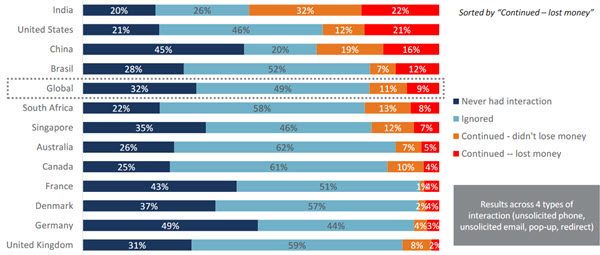The Internet is no more a safe place thanks to the numerous predators earning quick bucks by looting users. It is now reported that like Ransomware, Tech Support Scams are on the rise too. These attacks are something that would be obvious for someone who is well acquainted with the Internet environment but for the uninitiated, this can cause a ton of problems.

Tech Support scams on the rise
The study from Microsoft says that relative youth and an aptitude for technology are no longer guaranteed to keep you safe. This is what Courtney Gregoire, an attorney from Microsoft’s Digital Crimes Unit had to say about the same,
“By leveraging pop-ups, unsolicited email and scam websites as additional entry points for scams, fraudsters are reaching a broader number of people, including younger-than-expected victims.” The reports further indicate that “The data indicates that victims older than 65 are more likely to be reached by telephone (44 percent unsolicited call, 38 percent pop-up or online ad, 33 percent unsolicited email, and 26 percent redirected to website)”
The study further states that,
“In contrast, millennials aged 18 to 34 are more likely to have been redirected to a fraudulent website (50 percent) or duped by a pop-up advertisement (59 percent) as compared to receiving an unsolicited call (26 percent)”
Among the 55-percent of those who interacted with the scammers lost money while on the brighter side 92 percent of them were able to recover at least a part of their lost money. However, consumers in China and India were able to recover relatively lesser money. In totality, the report says that two-thirds of consumers across the globe have been a victim of the tech support scam and 10-percent of them lost money.
The fraudsters usually use remote access mode to access all the personal information and some also go to an extent of gaining admin rights and manually turning off the anti-virus. Next time you hear an online tech support trying to reach you through any medium make sure that you authenticate their identity and refrain from giving remote access to your machine.
Just want to mention Courtney Gregoire of MS is daughter of fmr Gov. Christine Gregoire (D) of State of Washington…in re earlier TWC story re “MS predicts Clinton wins with 87%”; lot of career pols in MS/media, caveat emptor and always vote your own mind.